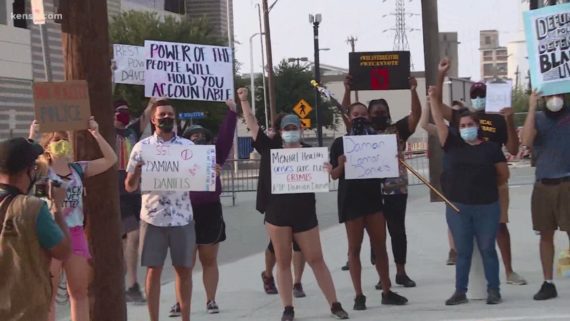
Protesting shooting
(5-18-21) Damian Daniels, a 30 year-old combat veteran who’d been diagnosed with paranoia, had not taken his medication. He called the police to complain about noises in his house. He suspected it might be haunted.
Daniels was well-known to local law enforcement as an individual with a mental illness. Two deputies went to his house and Daniels told them that he’d not taken his medication that day. They asked Daniels if he wanted to hurt himself and he replied that he didn’t. They asked him if he’d like the deputies to check his home for noises and he said no. Before leaving, they told him that he needed to take his medication.
There was no evidence that Daniels was a danger to himself or others, the officers wrote after that meeting. He didn’t meet the criteria for an emergency detention.
The next day, deputies again were called to Daniels’ house. This time, he was sitting outside with a .40 caliber handgun tucked into his waist band. Daniels was clearly in the midst of a mental health crisis but he didn’t want to go with the officers. When he refused to obey them, the encounter turned ugly. Deputies shot Daniels with tasers. He tried to take a taser away from them. A deputy drew his service weapon and fired twice killing Daniels.
What makes this August 2020 fatality different from other shootings is that it happened in San Antonio, Texas, a city that for nearly two decades has been considered a national model for how its law enforcement officers deescalate mental health crises.
San Antonio has a 16-member Mental Health Crisis Unit that has been featured on HBO in the documentary, Ernie and Joe Crisis Cops. In receiving a 2017 award, the unit was praised:
More than 100,000 people have been diverted away from jail or emergency rooms thanks to the work of the San Antonio Police Department’s mental health detail and its Crisis Intervention Training program. The program has reduced the need to use force and instead has helped to connect people with the mental health services they need.
Daniels’ death sparked protests partly because he was another black man fatally shot by law enforcement officers and partly because the community’s award-winning mental health crisis unit was not sent to meet with Daniels before the shooting even though deputies had been at his house the day before.
Sheriff Javier Salazar defended his officers. He told reporters there wasn’t any reason for his deputies to have detained Daniels the day before, nor was there time the next day for deputies to request help from the specialized team. Even if the unit would have been summoned, Salazar insisted the shooting would have happened because Daniels resisted and was armed.
Sheriff Javier Salazar’s claim amounts to a shrug of the shoulders. I doubt his predecessor, former Sheriff Susan Pamerleau, a national known advocate for CIT and improved mental health services, would have been so certain.
Bexar County Judge Nelson Wolff told reporters the situation wasn’t handled well. “Someone from that 16-member team should have gone and someone from the Center for Health Care Services should have gone out there.” The judge reminded the public that Daniels was known among law enforcement because of his illness.
Continuing, Judge Wolff said, “In cases like this, with known mental health issues, it may have been better to send crises mental health professionals rather than deputies with guns and uniforms. I am asking …what additional mental health staff would be required to augment our Mental Health Department enabling us to better respond to cases like this.”
Judge Wolff recently convened a Task Force on Criminal Justice and Behavioral Health and has appointed Judge Oscar Kazen and long-time National Alliance on Mental Illness advocate and parent, Doug Beach, to study how the community can better react to such crises.

Doug Beach NAMI Advocate
The judges’ and Beach’s response is what responsible leaders do in these circumstances. In my opinion, local NAMI chapters need to play an active leadership role when someone with a mental illness in their community is wounded or shot. By some accounts more than 40 percent of fatal police shootings involved someone in a mental health crisis.
I’ve met Judge Kazen, who has been a leader in diverting individuals who are clearly ill into treatment rather than jail and prison. And I have known and have appreciated Doug Beach’s advocacy for years in Bexar County. These two men’s appointments as co-chairs of the task force will do much to help preserve San Antonio’s reputation.



